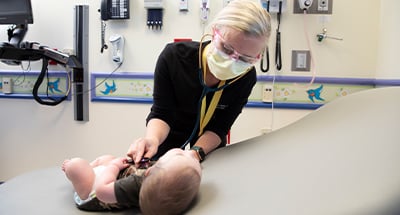Prader-Willi Syndrome Clinic


Prader-Willi Syndrome Clinic


The multidisciplinary Prader-Willi Syndrome Clinic provides children and teens with Prader-Willi syndrome (PWS) the comprehensive care this complex disorder requires.
The clinic allows children diagnosed with PWS and their families to meet with multiple experts involved in managing PWS within a single clinic visit. This team-based approach fosters collaboration between your child's specialists to provide coordinated, comprehensive care for your child.
Your visit will include some or all of the following specialties, as needed:
About Prader-Willi syndrome
Prader-Willi syndrome (PWS) is a genetic condition that affects many parts of the body. PWS is caused by loss of function of genes on chromosome 15. Most cases are not inherited and occur randomly.
In infancy, PWS is characterized by low muscle tone (hypotonia), feeding difficulties, poor growth and delayed development. In early childhood, affected children develop an extreme appetite, which often leads to overeating and obesity. Children with PWS are typically treated with growth hormone therapy soon after diagnosis because of the benefits in weight, strength and development.
Other signs and symptoms of PWS may include:
- Mild to moderate intellectual disability
- Sleep abnormalities
- Delayed or incomplete puberty
- Scoliosis
- Short stature
- Unusually fair skin
- Underdeveloped genitals
- Strabismus
- Small hands and feet
- Distinctive facial features such as a narrow forehead, almond-shaped eyes and a triangular mouth
- Behavioral problems including temper tantrums and obsessive-compulsive tendencies
- Obesity-related comorbidities including heart disease and type 2 diabetes mellitus
What to expect during your child’s visit
The multidisciplinary PWS Clinic at Children’s Mercy occurs the first Wednesday afternoon of the month on the 6th floor at the Children’s Mercy Broadway Endocrine Clinic. Free covered parking is available.
Prior to your child’s visit, you can expect a phone call from the PWS Clinic nurse coordinator to help tailor the visit specifically to your child’s needs and answer any questions you have. Visits will include height and weight measurements, questionnaires and possibly blood draws or X-rays. Some providers will see you in-person, while others will be virtual on a computer screen. Visits will be approximately 2-4 hours, depending on how many providers your child is scheduled to see.
How to make an appointment
The multidisciplinary PWS Clinic is lead by Kelsee Halpin, MD, MPH and Emily Paprocki, DO. For more information about the clinic, contact the Endocrinology Division at (816) 960-8803 or email PWS@cmh.edu.
Additional PWS resources
For more information about PWS, please visit the websites below: